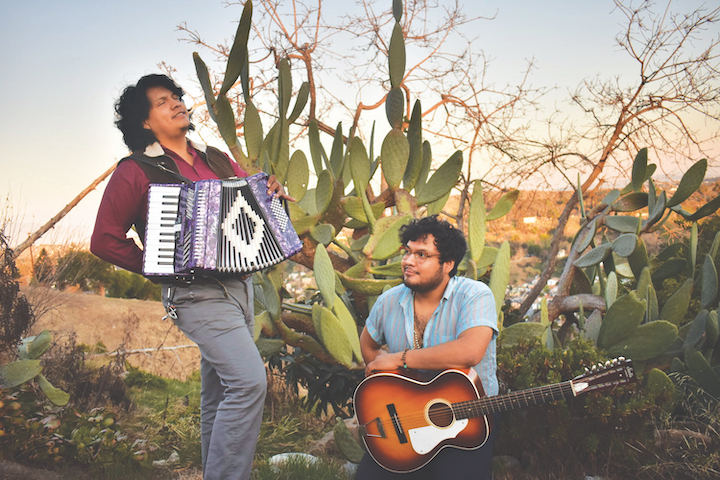Los Lobos usually doesn’t have the time to see every band who opens for them. However, the renowned Grammy Award-winners made sure they made time to check out their opening act, Tropa Magica, the last time they performed in Santa Cruz.
“We look forward to hearing [Tropa Magica] play and meeting the band,” Los Lobos multi-instrumentalist Steve Berlin said before their show at the Rio Theatre last April. “I’m a huge fan.”
Tropa Magica founders, brothers David (guitar, vocals) and Rene Pacheco (drums, vocals), have felt a connection with Los Lobos since they first heard them on the La Bamba soundtrack. Both bands are also products of East L.A., which tightens the bond.
“[Opening for Los Lobos] was a milestone marker for us,” David says. “We’ve been fans since we were kids, so it was super awesome to perform with them and meet them. It’s so cool.”
Tropa Magica may not sound like Los Lobos, but their approach to music is quite similar—like a stone soup, both bands use various ingredients, or influences, to create something uniquely their own. And rules need not apply.
“KoopaCabras,” the closer on Tropa’s 2018 self-titled debut, drops like a flying saucer in the middle of the Mohave. The intergalactic desert rock is charged by David’s Fender Jazzmaster reverberating extraterrestrial dissonance and Rene’s machinegun chops on drums.
With elements of psych-rock, cumbia, stoner rock, Bossa nova, grunge, surf and even sprinklings of disco here and there, it’s challenging to define Tropa. Thankfully, the Pacheco brothers have done it for us.
“We call our music psychedelic cumbia-punk,” David says. “There’s not any category [of music] that we fit into.”
Adds Rene, “Being in L.A., it was easy to get influenced by psych-rock and adding Latin rhythms and cumbia just melds together nicely–it’s very drum-driven and heavy on the bass and guitars. Tropa Magica is a sound that we’ve cultivated over 10 years.”
Every Saturday, within a three-block radius of the Pacheco brothers’ house, there were birthday parties, weddings, quinceañeras or get-togethers, and DJs would blast mostly contemporary cumbia music like Kumbia Kings and Selena Quintanilla.
“There’s a nostalgic feeling of kids running around while the parents are partying it up dancing,” David says. “We might not have even known whose party it was, but that adds to the environment where we live. Despite the rent going up or other things, [East L.A.] is always a very celebratory environment.”
Thematically, David and Rene never need to venture far for inspiration—the sights and sounds of their childhood memories and neighborhood course through their songs. Those sights and sounds aren’t always joyous, though, especially in the political climate that surrounded them throughout their teenage years.
“We saw a lot of harassment during the Bush era and many deportations,” Rene recalls. “Sometimes, we would see street vendors harassed by immigration officers, and you would see them running by with their carts and everything they were selling. On Whittier Boulevard, [immigration] would just start confiscating their goods. Then, other [vendors] would begin to see what was happening and run away. It was pretty nuts.”
Rene and David directed their anger and frustration into their music, namely punk and grunge. Tropa’s 2019 7-inch Smells Like Cumbia features a spacy cumbia rendition of Nirvana’s “Come as You Are.” The unexpected marriage of East L.A. and Seattle works very well.
“There was this angst aspect in music in the ’90s, and many bands like System of a Down and Rage Against the Machine have that, but something about Nirvana is so beautiful—their melodies combined with a nice scream,” David says. “It is easy to relate to.”
Tropa’s sophomore record, Tripiando Al Infinito En Mi Recámara, (Tripping to Infinity in my Bedroom) could be the band’s first masterpiece—of many to come. The 2020 album flourishes with clarity, conviction and a couple of oddball homages: the ballad “Lou Reed’s Speedo” expresses feelings of love and hate towards the late Velvet Underground frontman, sung in English and Spanish. The album bookend, meanwhile, “If John Lennon Could Fly,” is a minute-long instrumental that sounds like it could be a long-lost ending to “For the Benefit of Mr. Kite.” A second pressing of the vinyl was recently released.
“Feels Like Tijuana,” the album’s single, driven by a swirling melody and punch-drunk accordion, can only be defined as “psychedelic cumbia-punk.” Like a Pogues song, the upbeat rhythm is nothing more than melancholy in disguise: “Es sombra lo que soy cómo el día si en sol,” David sings. Translation: “I am like the shadow on a sunny day.”
“Surfin’ Brain” is a viciously wonderful juxtaposition to “Feels Like Tijuana.” The bright harmonies and toothy instrumental smile equate to the adoration of Brian Wilson—Tropa moves from English vocals to Spanish midway, bringing Latin flavor to the stark white Beach Boys’ sound.
After nearly 12 years of nonstop touring, the Pacheco brothers are beginning to see the pay-off of their labor. Tropa has had some songs picked up for the Netflix series Gentefied and the popular comedy special Felipe Esparza: Bad Decisions. Additionally, the 805 beer company recently signed the group to the second year of sponsorship.
Tropa’s third full-length album, III, dropped in the spring of 2022, only adding more depth to the group’s repertoire. “Sonora Distance” transports listeners to oldtown Bogotá in another dimension—the fusion of traditional cumbia with David’s resounding guitar solos picks up where Tripiando Al Infinito En Mi Recámara leaves off. ¡Qué buena noticia!
Tropa Magica plays Friday, July 22 at 9pm. Moe’s Alley, 1535 Commercial Way, Santa Cruz. ¿Qiensave? opens. $16/$20 plus fees. folkyeah.com.













